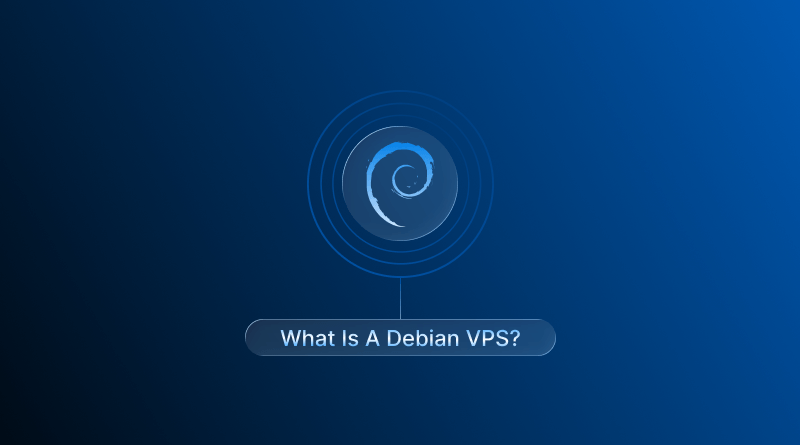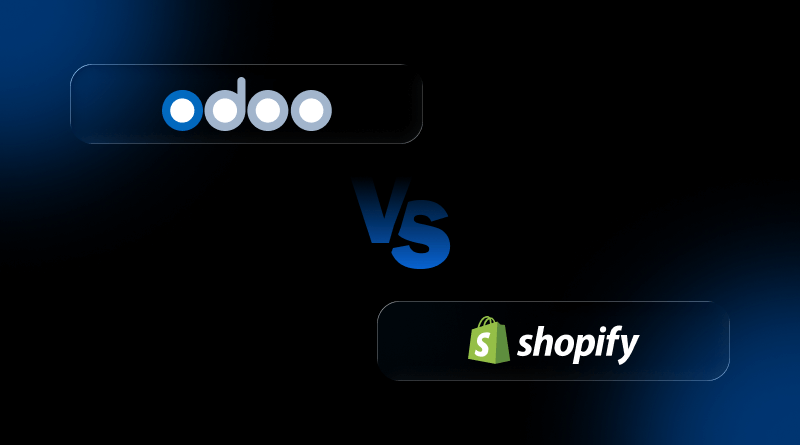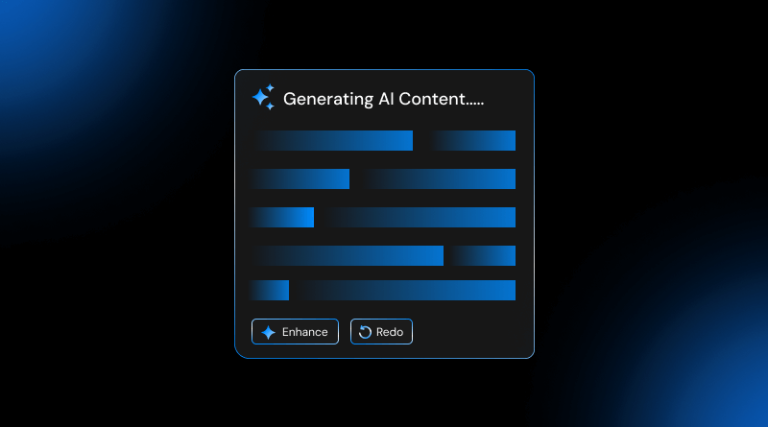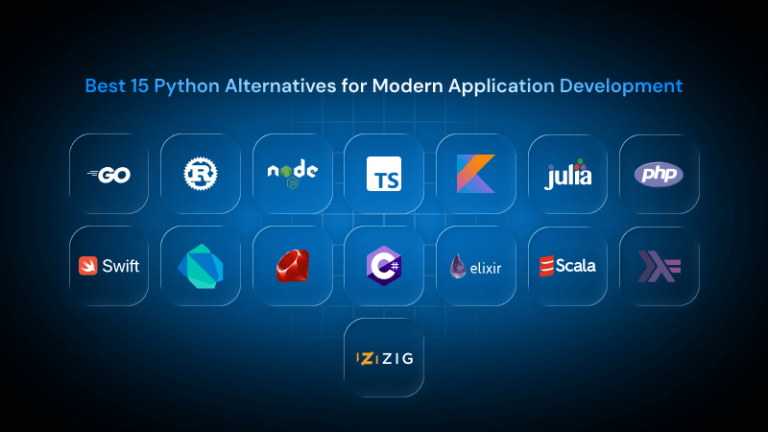The term “VPS” often makes people think of complex, high-level engineering—and honestly, that’s fair. But here’s the reality: choosing a Debian VPS isn’t just about raw power; it’s about choosing the most dependable operating system available. For anyone serious about a project—from a blogger anticipating massive growth to a senior sysadmin juggling dozens of critical client servers—you’re investing in stability, security, and predictable performance that no cheap shared environment can ever promise. You buy predictability, which is arguably the most valuable commodity in technology.
If your website isn’t stable, nothing else matters. You can spend thousands on design, but if the server crashes during a traffic spike, all that effort goes to waste. This commitment to an unshakable foundation is why selecting a powerful web hosting solution, specifically Debian VPS hosting, is the single most critical decision for any project aiming for long-term success. Now, let’s skip the complex documentation and discuss why Debian is the ultimate workhorse—the silent engine that keeps the internet running smoothly.
Table Of Content
The Debian VPS: Your Unbreakable Server Foundation
A Virtual Private Server is a dedicated segment of a large, fast physical machine. It’s partitioned so that your environment is fully isolated, meaning your CPU, RAM, and storage are dedicated to you. Your neighbor’s traffic spike or failed script won’t affect your performance in the slightest. This is a great leap from shared hosting, where you stay one step away from disaster caused by resource consumption from other users.
Why Do Experts Rely on Debian?
Debian is one of the oldest and most trusted Linux distributions globally. It’s the parent of systems like Ubuntu, but it resolutely stuck to its core principles: stability through rigorous testing. For anyone exploring What is a Debian VPS server? The answer is simple: It’s simply this reliable OS running in that isolated environment.
Stability Over Speed: Debian’s update cycle is deliberately methodical by design. Packages must pass rigorous, extensive testing—moving through “testing” and “unstable” environments—before they ever hit the “stable” release. This isn’t just stability; it’s a commitment to zero unplanned downtime. Because of this, you get a system that just runs, letting your team keep their focus entirely on building your product, not fixing server errors.
Built for Longevity (LTS): Since Debian is so meticulous, it offers excellent LTS (Long-Term Support). This feature is critical for any business with compliance requirements or legacy applications. You aren’t constantly forced into expensive, time-consuming upgrades just because a developer arbitrarily decided to abandon an older version. That extended lifecycle translates directly into lower maintenance costs and far more predictable IT budgeting.
When you put the VPS’s guaranteed power on top of Debian’s reliable foundation, you end up with a server you can confidently run your whole operation on.
Why Stability Translates Directly to Cash and Trust
This isn’t just theory — it’s what happens in practice. The unique features of Debian directly impact your budget and how much customers trust you. When you look at the benefits of Debian VPS, it’s clearly a smart financial move.
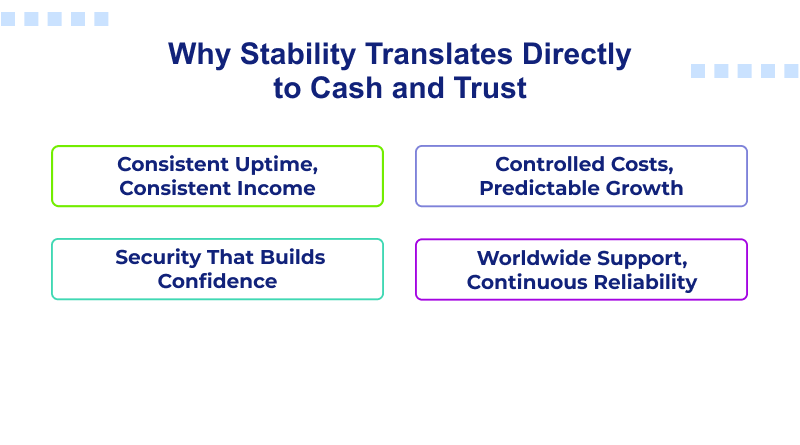
1. Consistent Uptime, Consistent Income
For high-stakes work, whether it’s an e-commerce platform or a critical API, you simply must have stability. Fortunately, Debian’s rigorous process is designed to ensure that upgrades won’t cause catastrophic crashes or conflicts. You can confidently deploy code changes, knowing the underlying OS will remain dependable. This predictable reliability simply guarantees maximum uptime, meaning you stop losing money and you keep your customers happy because your website isn’t constantly failing.
2. Security That Builds Confidence
The security benefit is powerful. First, because Debian updates are highly controlled, they introduce fewer accidental bugs that hackers are constantly searching for. Second, Debian is minimal: it’s not packed with extra graphical tools or unused services. Less running software means fewer open ports and a smaller attack surface overall.
If you are dealing with sensitive customer data, you need to be sure your communications are safe. Installing an SSL certificate on Debian is simple and immediately turns your website into a protected destination for visitors.
3. Controlled Costs, Predictable Growth
Why pay for resources that the OS itself just wastes? Debian is lightweight; it doesn’t need much RAM or CPU just to run itself.
This efficiency is crucial for performance. Most of the resources you pay your web hosting provider for are dedicated to your actual application—running database queries or serving visitors—not OS overhead. You can delay costly hardware upgrades and still guarantee peak performance, effectively giving you great results without the huge price tag. It’s proof that smart software outperforms simply buying raw hardware every time.
4. Worldwide Support, Continuous Reliability
The vast, veteran community is one of Debian’s secret weapons. Because so many other Linux systems are built on Debian, if you run into any weird configuration problem, the solution has almost certainly been found and documented by someone else already. This wealth of forum threads, official documentation, and veteran sysadmins ready to share advice saves countless hours of troubleshooting time, making your server management infinitely easier than relying on proprietary systems.
Debian in the Modern Development World
Don’t mistake “old” for “outdated. Debian is the perfect backbone for the newest technologies because modern development demands control, and Debian gives you complete command.
Precision Coding and Deployment
Debian is the developer’s choice because it offers complete control over dependencies. You can install precise versions of your tools without that common problem of conflicting software that affects other operating systems.
Serious Back-End Work: For developers focused on high-performance languages, the ability to fine-tune the OS is vital. Those using the Best IDE for Golang need a well-structured environment to ensure their compiled code is tested in conditions that exactly mirror the final production environment.
Front-End Stability: If you manage large client-side frameworks, a stable Debian host is perfect for deploying complex apps built with React or Angular. You can manage server-side assets effortlessly using a preferred JavaScript Code Editor, ensuring a smooth, consistent experience for your users.
Leveraging AI and Builder Tools
The need for a stable host has never been greater, especially with complex, resource-intensive workflows like AI development and containerization.
AI Control: Developers building applications around large language models need a reliable server to execute custom scripts and refine data. The stability ensures that resource-intensive processes don’t crash the host. You can use the VPS to safely execute and test custom ChatGPT prompts using locally stored data before deployment.
Building for Scale: Even if your team uses a sleek, drag-and-drop tool, the server underneath must be rock-solid. Anyone using an AI website builder relies entirely on the VPS stability to deliver their content quickly and securely.
Marketing Assets: Your most critical marketing pieces, like the pages created using a landing page builder, have to load instantly. Hosting on a solid Debian VPS locks in that speed. That performance increase directly lifts your conversion rates, instantly making your campaign spending more profitable
Master the Server: Taking Control with the CLI
Choosing Debian means you’ll be working mostly in the Command Line Interface (CLI). While it has a slightly steeper learning curve than a graphical user interface (GUI), this level of control is where the real power lies.
Command Line Efficiency
All serious server management—from installing packages (apt) to monitoring system load (htop)—is done through the CLI using an SSH client. This control allows for unparalleled automation and scripting; you can write one script to handle tasks that would take an hour of clicking in a GUI. Experienced administrators find this method faster and more reliable than navigating graphical control panels.
Smart Scaling and Monitoring
While a VPS gives you dedicated resources, you must proactively monitor them. You should use tools like htop to keep a real-time watch on CPU, RAM, and disk I/O. The true benefit of a VPS is its scalability: if your application goes big, you simply contact your web hosting provider to allocate more RAM or CPU cores without the hassle of migrating the entire OS to a new environment. This ability to scale seamlessly is crucial for handling unexpected viral growth, so you’re ready when your project suddenly goes big.
The Debian VPS is the choice of professionals, not because it’s fancy, but because it is completely dependable. It combines the isolated resources of a VPS with Debian’s proven stability and minimal footprint to create a powerful, enduring system.
You’re buying reduced downtime, faster performance, and the peace of mind that comes from using a server OS trusted globally. Whether you’re setting up a new e-commerce website, deploying code from a top-tier IDE, or simply ensuring your customer data is protected by security standards, Debian provides the predictable, unbreakable foundation your project truly needs to thrive. It’s the silent engine that ensures worry-free operation.
FAQs
1. What is Debian used for?
Debian is the unsung hero that runs the internet. It’s the go-to choice for building powerful, reliable servers and huge databases that can never crash. If you need something that just keeps running perfectly for years, and rarely needs a reboot, you use Debian.
2. What is the purpose of VPS?
The point of a VPS is to give you dedicated control and guaranteed performance without having to buy physical gear. You get your own piece of the machine, meaning your resources aren’t shared with anyone else. Getting that stability and control is the primary benefit of Debian VPS—no more worrying about what your virtual neighbors are doing.
3. Can I use Debian on Windows?
Yes, absolutely, you can! You won’t run Debian as your main Windows desktop, but you can install it easily through the Windows Subsystem for Linux (WSL). This lets you run a fully functional Debian environment inside Windows. It’s an outstanding approach for developers to gain access to all the command line tools and package management.
4. Is Debian still good in 2026?
Definitely! It’s still one of the best for heavy backend work. In reality, Debian doesn’t chase every shiny new feature; it just focuses on rock-solid security and keeping things stable for the long term. That deliberate, slow approach is its greatest strength, making it the most trustworthy system for running your backend.
5. Is Debian better than Ubuntu?
Neither one is strictly “better”—they just serve different needs. Ubuntu uses Debian as its base, so it gets that core stability, but it focuses more on being easy to use and having all the flashy new desktop features. Debian, on the other hand, stays lighter, cleaner, and far more stable, which makes it a smarter pick for production servers. When you’re specifically exploring what is a Debian VPS for a stable backend, Debian often stands out as the professional’s choice.

